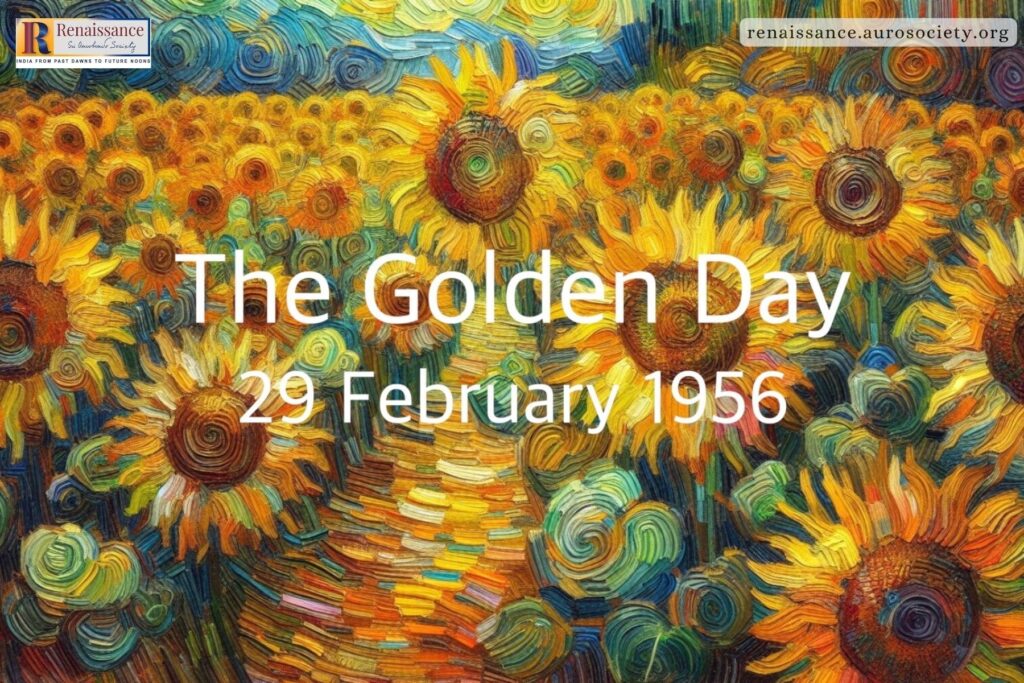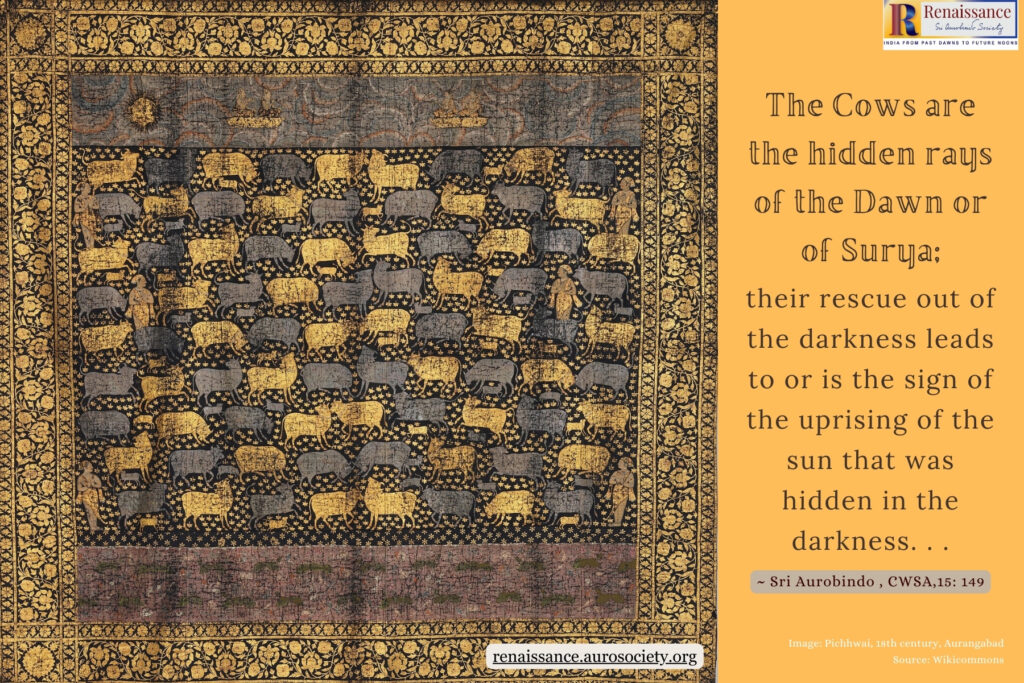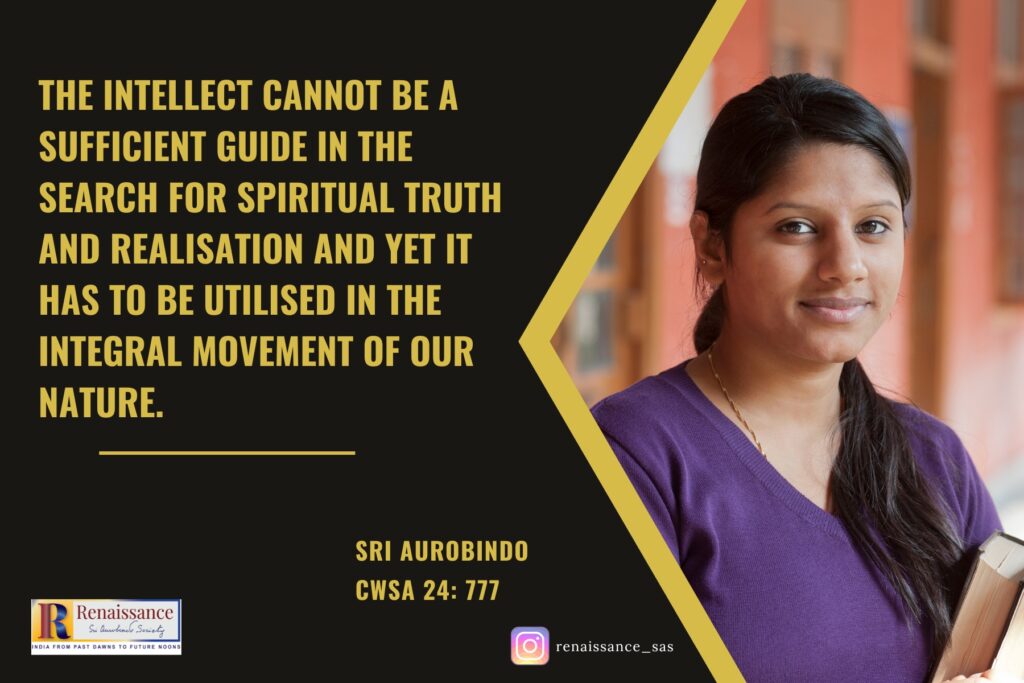Sri Aurobindo’s Integral Yoga covers every aspect of life and creation so deeply that there is nothing in the cosmos that cannot be understood from his writings. Conversely, his teachings are so comprehensive that an infinitesimal part of it can be recognized in every element of manifestation in the world.
Every event in history, in fact the entire evolution of humanity can be understood from his essays. The foundations of ancient civilizations and the richness of Indian culture and philosophy can be better appreciated with the help of his works. He delineates social and national movements for us. We become better able to value literature, poetry and the arts in general from his treatises on literature.
This article looks at the world of literature from the perspective of Sri Aurobindo’s writings. It illustrates how it is possible to understand Sri Aurobindo through insightful literature and appreciate literature as a reflection of the truths of life as expounded by Sri Aurobindo.
Sri Aurobindo calls William Shakespeare a seer of life (CWSA, Vol. 26, p. 79). Shakespeare reflected life truthfully in his drama, capturing life’s subtle nuances and responses. This is true for all insightful writers and great works of literature.
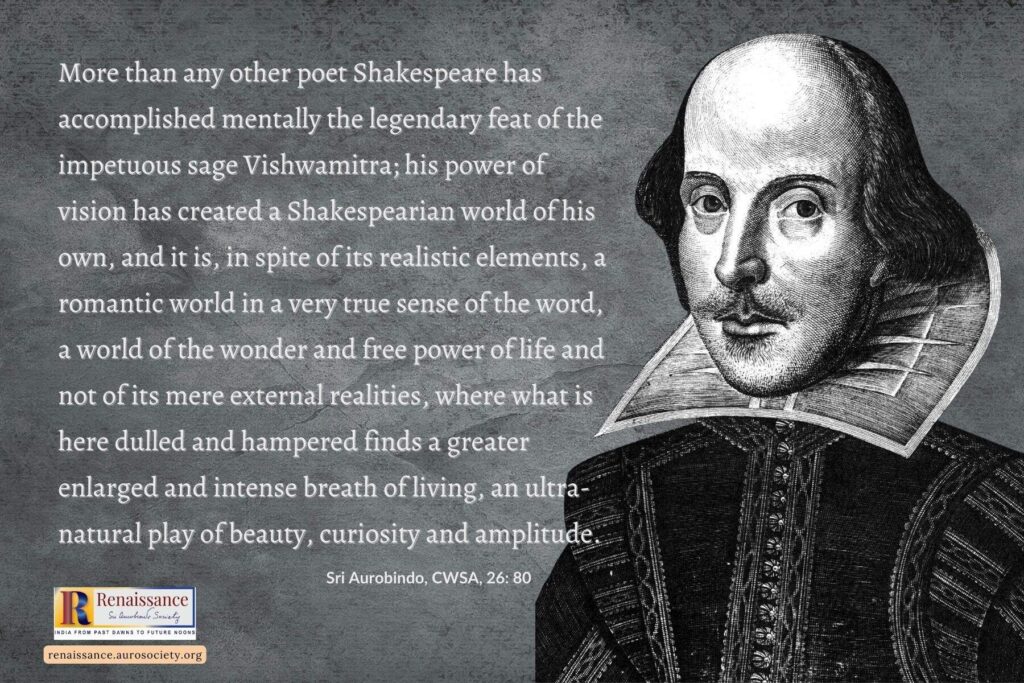
Literature entertains us with suspense, humor and action. Great literature transcends action and presents insights into human character and reveals the complex ways in which character and action interrelate to generate chains of consequences. Still finer literature reveals the complex interactions between action, individual character and the evolving character of society. The greatest literature goes further. It reveals the character of life itself. In this revelation, we catch a glimpse of Sri Aurobindo’s ideas.
The following are a few instances from literary works that illustrate the truths in Sri Aurobindo’s writings, and also show how his thoughts are reflected in every aspect of individual and social life that great literature portrays.
The social evolution of the human race is necessarily a development of the relations between three constant factors, individuals, communities of various sorts and mankind. Each seeks its own fulfilment and satisfaction, but each is compelled to develop them not independently but in relation to the others. [. . .]
[. . .] The pressure of the large movements and fluctuations of the race has always affected the destinies of its separate communities, and there has been a constant return-pressure of separate communities social, cultural, political, religious to expand and include, if it might be, the totality of the race.
Sri Aurobindo, The Human Cycle, CWSA, Vol. 25, p. 421
The interconnected components of society – the individual and the collective – influence and in turn are influenced by each other. What begins as a random individual act is replicated by more and more people all around till it becomes a larger collective phenomenon. This in turn sweeps everyone along in its current and emerges as a social movement. Every society undergoes a continuous process of adaptation and transformation, sometimes through sudden upheavals, more often through a slow, gradual change – revolution or evolution.
Charles Dickens’ David Copperfield
Charles Dickens’ David Copperfield depicts the evolution of English society through the Industrial Revolution — the rising individual aspirations and the social changes in England that impact people. The struggles and aspirations of the poorer classes in 19th Century England are portrayed alongside the gradual changes taking place in English society.
The slow social ascent that was made possible by industrialization, shipping, colonization and trade are seen in the personal lives of several characters — David, Clara Pegotty, Emily, Mr. Mell and the Micawbers. They rise from the lower levels through hard work, determination, and the good will of friends, and are supported in this rise by the general changes in society.
If you remain peaceful within, in a state of surrender, then obstacles and difficulties will not be able to disturb you. Unhappiness and anxiety and “Why is this not happening? When will it happen?”, if you allow these feelings to enter into you, then obstacles and difficulties will find strength. Why do you pay so much attention to them? Remain peaceful and surrendered within.
Sri Aurobindo, Writings in Bengali, CWSA, Vol. 9, Letters on Yoga, Letters to N.
Much of our action is reaction to what we see, hear, think, imagine or feel. And all of our reactions come from our ego. When we react to any person or situation with a negative attitude – anger, irritation, pride, excitement, envy – we dissipate our energy and cancel opportunities. To remain calm, undisturbed and surrendered in the face of difficulties carries inner power. This power accomplishes, moving us from the surface to the depth of our personality, thereby removing all disturbances of the ego. Our surrendering to the divine makes the world surrender to us.
Jules Verne’s Around the World in Eighty Days
Phileas Fogg in Jules Verne’s Around the World in Eighty Days is the epitome of calmness. Fogg has staked his entire fortune on a wager that he will go around the world in eighty days. He is faced with several unexpected and strange challenges all along the route. Typhoons, dacoits, wild animals and other interruptions threaten to delay his journey. But all through the eighty days, even when he mistakenly believes he has lost the wager, Fogg remains perfectly undisturbed and quietly cheerful. He eventually wins the wager, a fortune, a faithful and resourceful servant, and a loving wife.
The earliest preoccupation of man in his awakened thoughts and, as it seems, his inevitable and ultimate preoccupation. . . manifests itself in the divination of Godhead, the impulse towards perfection, the search after pure Truth and unmixed Bliss, the sense of a secret immortality . . . The earliest formula of Wisdom promises to be its last, — God, Light, Freedom, Immortality.
Sri Aurobindo, The Life Divine, CWSA, Vol. 21, pp. 3-4
Sri Aurobindo begins his magnum opus The Life Divine with the human aspiration. Human beings have always aspired, and those aspirations have reached towards the attainment of ideals and values far beyond their reach. But it is this aspiration for the highest that has spurred us to excel ourselves, and eventually attain the goal.
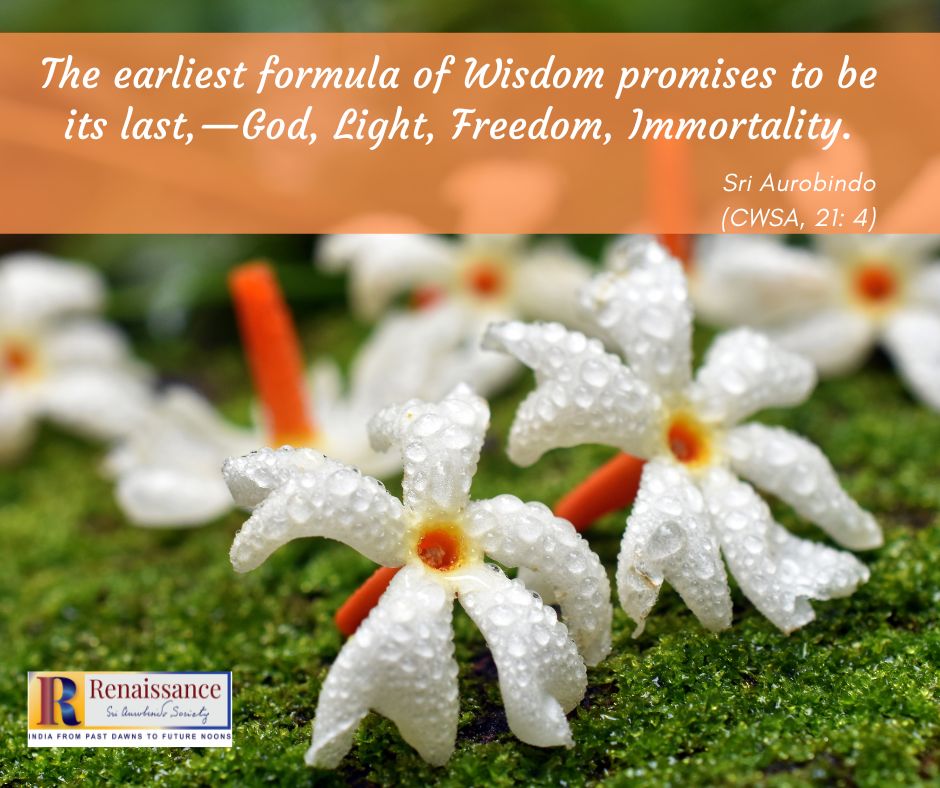
Jane Austen’s Pride and Prejudice
Jane Austen’s Pride and Prejudice is a story of family, friendship, disappointments and marriages. But at the same time, it depicts the enormous power of intense human aspiration for its own fulfilment. Mrs. Bennet wants marriage for her daughters. Each daughter aspires for a life after her own values. Everyone’s aspiration is fulfilled according to the intensity of one’s aspiration and the strength of personality.
We see this phenomenon mirrored in every major and minor character. Charlotte Lucas wants social security, she receives that in William Collins. Collins wants to move closer to the upper classes, which he achieves amply. Even the intense aspiration of people like George Wickham who refuses to be subservient to others, and Mr. Bennet who wants to be left alone in peace are eventually honoured by life.
High moral qualities or merits alone cannot make one win a race or wrestling bout; the necessary strength is indispensable. The sublime work that has to be accomplished cannot be achieved by passion alone; strength is necessary.
Sri Aurobindo, Writings in Bengali, CWSA, Vol. 9, The Problem of the Past
Sri Aurobindo tells us that accomplishment requires many conditions to be met, such as aspiration, truth, supporting social climate and positive values.
Underlying all of them is strength. When one is weak at any level – physical, vital, mental, spiritual — no virtue can find its complete fulfilment in one’s life. Initiatives that originate from weakness adversely affect the flow of events. Life responds to strength.
Alexander Dumas’ Count of Monte Cristo
Alexander Dumas’ Count of Monte Cristo tells the story of a man of virtue who is buffeted by forces beyond his control as long as he remains weak. The young, innocent, trusting Edmond Dantès falls prey to the jealousy and intrigue of unscrupulous people around him who destroy his career, family, freedom and future.
During his time in a dungeon, over eight years, with the help of Abbé Faria, he becomes physically, emotionally and mentally a stronger man. Armed with this strength, Dantès who was earlier at the mercy of others’ caprice, is able to write his own destiny. As the Mother says, “difficulties come because there are possibilities in you.” (CWM, Vol. 14, p. 220) Dantès’ difficulties bring out the possibilities in him.
. . . the supreme Grace will act only in the conditions of the Light and the Truth; it will not act in conditions laid upon it by the Falsehood and the Ignorance.
Sri Aurobindo, The Mother, CWSA, Vol. 32, p. 3
All that is great stands on the strength of truth. Falsehood in any form, be it exaggeration, trick, ruse, insincerity or a lie, has a negative impact.
William Thackeray’s Vanity Fair
William Dobbins in William Thackeray’s Vanity Fair is as truthful and sincere as humanly possible. The girl he loves, Amelia, wishes to marry his friend. All that Dobbins sincerely wants is her happiness. He brings about her marriage to his friend. He remains true to the friend, silently faithful to Amelia, kind to the family through their hardships, and is eventually rewarded with unalloyed happiness.
Dobbins wades through politics, war, unscrupulous men, conniving women, and the vagaries of life and comes out quietly triumphant. He shows that “honesty is the best protection.” (The Mother, CWM, Vol. 14, p. 201)
For all problems of existence are essentially problems of harmony. They arise from the perception of an unsolved discord and the instinct of an undiscovered agreement or unity.
Sri Aurobindo, The Life Divine, CWSA, Vol. 21, p. 4
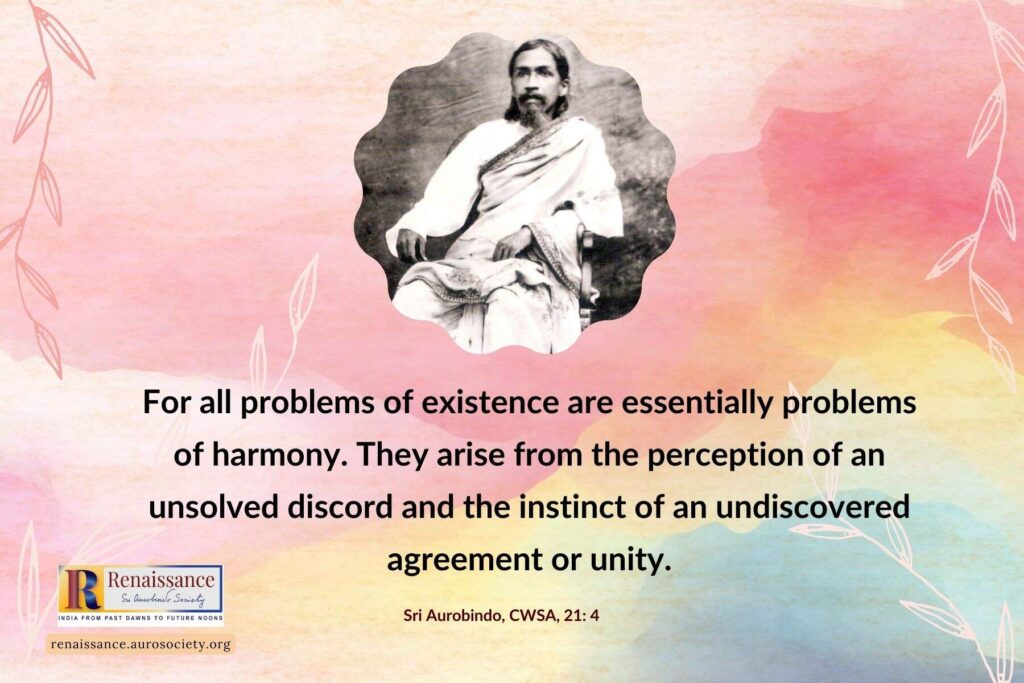
All problems are fundamentally problems of harmony.
When there is no discord between us and those around us, such an atmosphere of harmony supports and fosters growth and success. Pleasant relationships within a family, organization, and even countries enable smooth functioning. Friction retards. Harmony ensures that work that is taken up is successful, aspirations are fulfilled, relationships prosper and progress is made all around.
Louisa May Alcott’s Little Women
Louisa May Alcott’s Little Women series is a beautiful picture of America during and just after the Civil War. It revolves around the March family of four girls and their parents who remain cheerful, generous and courageous through war, illness and poverty. At every testing period, they remain united and refuse to compromise on their idealistic values. The March family is testimony to Mother’s statement that “a harmonious collective aspiration can change the course of circumstances.” (CWM, Vol. 14, p. 184)
Our outward happenings have their seed within
Sri Aurobindo, Savitri, CWSA, Vol. 33, p. 52
Each one is the artisan of one’s life circumstances.
Everything in the physical plane has its seed within. Our external circumstances reflect the inner reality within us.
William Shakespeare’ The Tragedy of Hamlet, Prince of Denmark
In William Shakespeare’ The Tragedy of Hamlet, Prince of Denmark, Hamlet is in a dilemma. He suspects his uncle of murdering his father, the late king. Hamlet loves his father and believes the ghost he sees to be his father’s. He wishes to obey his father’s orders and avenge the murder. Still, there is an inexplicable hesitation.
Meanwhile, the uncle dispatches Hamlet to England accompanied by two courtiers with a sealed letter. Unknown to Hamlet, the uncle has plotted against Hamlet. The sealed letter to the English king denounces Hamlet as a traitor who must be put to death. Restless on the ship one night, Hamlet opens the letter. He is no longer uncertain, he knows the truth. He is ready to return to Denmark and confront his uncle.
Soon after, the ship is attached by pirates. And in the fight that ensues, Hamlet finds himself on board the pirate ship and separated from his companions. Once his identity is known, the pirates transport him back to Denmark, where he can fulfill his mission.
The seer of life has perceived and consciously or unconsciously pointed to the truth of life that life is alive, it responds to us constantly.
In Hamlet we find that the pirate ship’s entry is in response to the prince’s decision and determination. When he is clear that he wants to return and meet his uncle, the pirates appear to take him back. As the Mother reminds: “the circumstances of our life. . . are the outward expression of what we are ourselves.” (CWM, Vol. 14, p. 214)
. . . each one meets in this life the circumstances which he has, inwardly and outwardly, built for himself
[. . .] It is always a mistake to complain about the circumstances of our life, for they are the outward expression of what we are ourselves.
The Mother, Words of the Mother, CWM, Vol. 14, p. 213-214
In all great works of literature, we find incidents that appear random, inexplicable, irrational or implausible to the logical mind. But they are natural and common to the vision of one who perceives the deeper working of life in its integral reality. Sri Aurobindo’s teachings and writings reveal these truths to us. Insightful writers capture, consciously or unconsciously, these truths of life and portray them in their works. Sri Aurobindo is the resplendent sun, and turn anywhere you will, one of the infinite rays will light up the way in front of you.
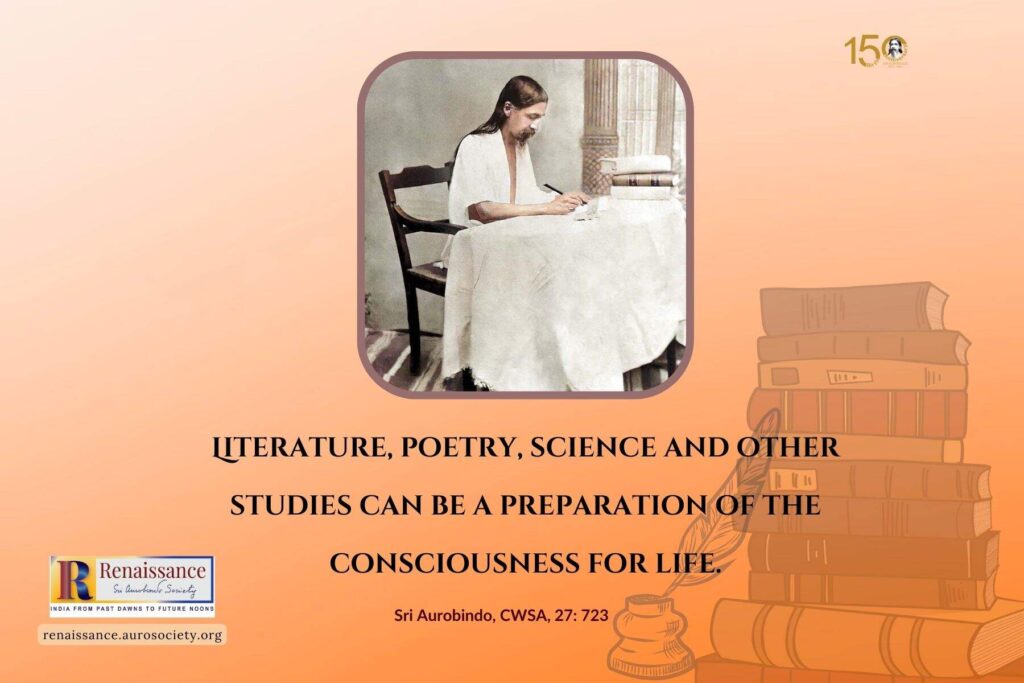

About the author: Janani Ramanathan is a Fellow of the World Academy of Art and Science and Research Associate at The Mother’s Service Society, a research institute founded with a view of studying and applying the teachings of Sri Aurobindo and The Mother. Janani has been involved in research in the social sciences for 25 years. Her areas of focus are education, literature and social development based on Sri Aurobindo’s theory of creation and evolution of consciousness.

~ Design: Beloo Mehra

